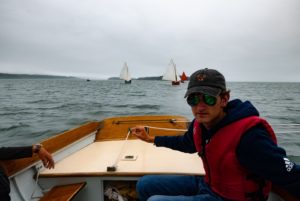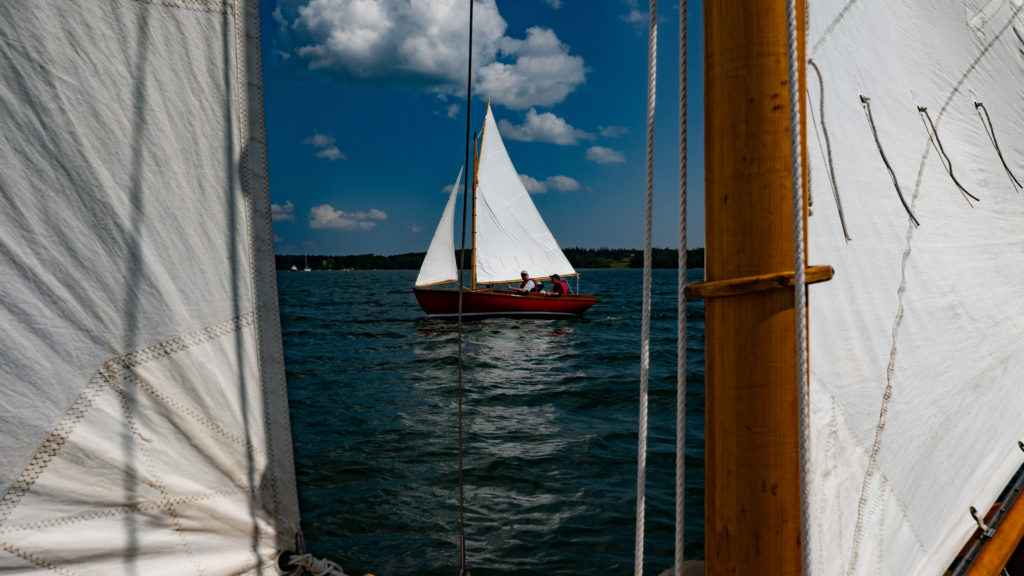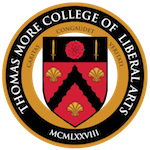The spirit of adventure is praised many ways in song, but one memorable line declares, “Some things in this world were meant to be free, like cowboys, sailors, and me.” This summer, Thomas More College struck out into the deeps of New England’s culture and launched its first sailing program, tasting the salty tang of freedom at sea.
For ten days, students studied and practiced the maritime arts. Led by William Fahey and John McCarthy, students were called to prepare ahead of time, by learning the parts of a boat, several common knots, and the stirring poem of John Masefiled—“Sea Fever:”
I must go down to the seas again, to the lonely sea and the sky,
And all I ask is a tall ship and a star to steer her by;
And the wheel’s kick and the wind’s song and the white sail’s shaking,
And a grey mist on the sea’s face, and a grey dawn breaking.
I must go down to the seas again, for the call of the running tide
Is a wild call and a clear call that may not be denied;
And all I ask is a windy day with the white clouds flying,
And the flung spray and the blown spume, and the sea-gulls crying.
I must go down to the seas again, to the vagrant gypsy life,
To the gull’s way and the whale’s way where the wind’s like a whetted knife;
And all I ask is a merry yarn from a laughing fellow-rover,
And quiet sleep and a sweet dream when the long trick’s over.
After a weekend of learning sea chanties and visiting nearby coastal sites such as Fort McCleary, Portsmouth, and the Maritime Museum in Kittery, Maine, the participants journeyed five hours up the coast of Maine—or “Down East” as the sailors of old said—to Brooklin. Along the way, they stopped at Castine, site of one of the earliest Catholic settlements in North America (established in 1613) and the location of the dramatic Penobscot Campaign (1779) of the American War of Independence.
After soaking in these historical sites, the program established itself in cottages along the coast, and began an intensive week working with the Wooden Boat School—the nation’s oldest traditional sailing school.
Classes are limited in size and everyone in the course must learn quickly and accurately how to tie bowlines, clove hitches, sheet bends, and all the necessary knots to brave the seas. On the first day, the students were on the water earning their sea legs. Aidan O’Connor, a rising junior a proctor in the program spoke of how the course teaches one to become fully aware of your surroundings, especially the wind and subtle changes of the tides.
The days in Maine began with calisthenics and breakfast and the Mariner’s Morning prayer—a form of lauds based on scriptural texts about the sea. From 8 A.M. to 5 P.M., the students were studying in one of two classrooms: their Boathouse overlooking Eggemoggin Reach, or on the sea itself. In the Boathouse, the students studied the principles and practice of sailing; how to prepare for the day; basic mastery of weather reading; nautical physics; and—most of all—the sailor’s love affair with wind.
The majority of the time was spent in a small fleet of four boats—Havens and Heershoffs—sailing towards Naskeag Point, around the Babson Islands, eventually daring the winds and tides of Eggemoggin Reach and rounding Torrey Castle and other nautical objectives.
After each full day (and a short break), the evening was marked by a hearty dinner, seminars with Drs. Fahey and McCarthy, stargazing, bonfires, and especially the singing of American and British sea chanties. After praying compline, the well-earned “sweet sleep” came with the benediction of cool Atlantic winds.
 During the seminars, students read and discussed accounts of sea battles by Herman Melville, stories by Sara Orne Jewett, and Coleridge’s The Rime of the Ancient Mariner, the latter being read aloud one evening by all the participants in succession.
During the seminars, students read and discussed accounts of sea battles by Herman Melville, stories by Sara Orne Jewett, and Coleridge’s The Rime of the Ancient Mariner, the latter being read aloud one evening by all the participants in succession.
The program culminated in a great lobster boil on the bay with about 90 other students from the Wooden Boat School. After consuming clams, corn, biscuits, and sometimes as many as three lobsters, the Thomas More students gave a twenty minute concert of sea chanties and traditional maritime folk music to the entire Wood Boat School faculty, staff, and students.
For all interested, please keep a weather eye out for future programs next summer.
Here is a Link for the Complete Album of the Summer Sailing Program.

